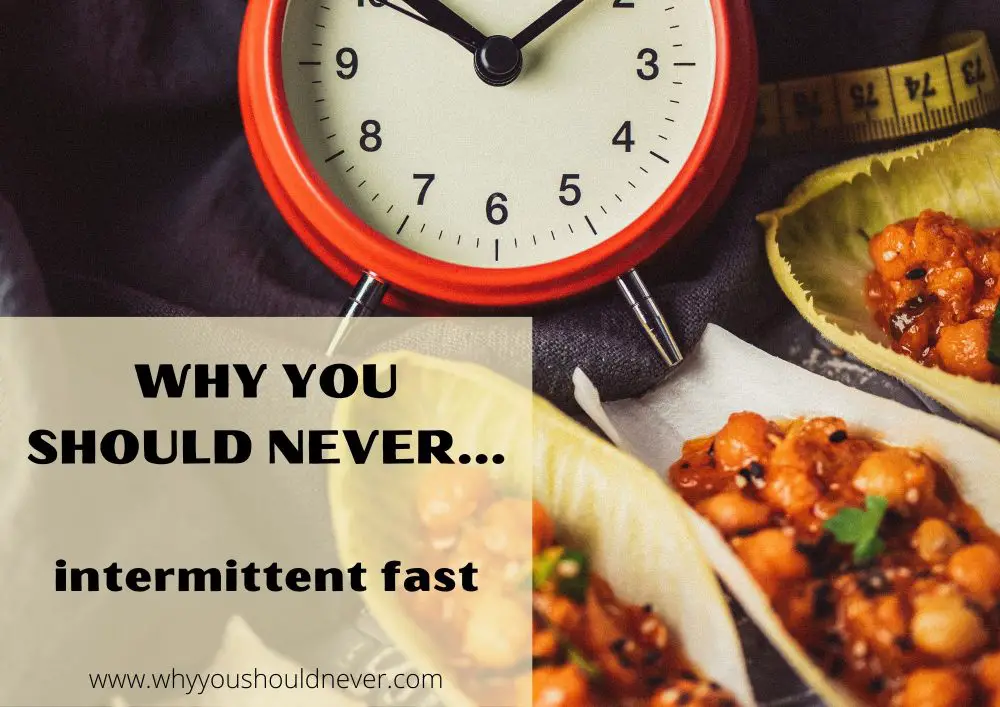![]()
Why You Should Never Intermittent Fast
When it comes to health and nutrition, everybody’s got an opinion. And when it comes to intermittent fasting, the opinions are particularly strong!
What is intermittent fasting?
Intermittent fasting is an umbrella term for various eating protocols that involve not eating for periods of time, ranging from 12 hours to a whole day. The most popular protocol is the 16/8 method, where you eat for eight hours and fast for 16.
There are many different ways to do intermittent fasting, and people do it for different reasons. Some people do it to lose weight, while others do it for health reasons or because they find it more convenient than eating several meals a day.
While intermittent fasting can be a great way for some people to improve their health and lose weight, it isn’t for everyone. In fact, there are several reasons why most people would do well not to try it. Let’s discuss them below.
7 reasons why you shouldn’t intermittent fast
1. You’ll get hungry
The whole point of intermittent fasting is to create a period of time where you’re not eating. This means that there’s a very real possibility that you’ll feel hungry during your fast.
And for some people, the hunger can be unbearable. If you’ve ever tried skipping a meal or going without food for an extended period, you know how quickly the hunger can set in.
For some people, the hunger is so bad that they can’t focus on anything else and end up breaking their fast early. If this happens frequently, it can make intermittent fasting more of a nuisance than anything else.
2. You could end up overeating
One of the dangers of being hungry is that you might be tempted to overeat when you finally do sit down for a meal.
This is especially true if you’re fasting for long periods, like 20 hours or more. When you break a long fast, your body is going to want all the food it can get.
And if you’re not careful, you can easily end up eating more than you would have if you had just eaten three regular meals. This can offset any weight loss benefits and might even cause you to gain weight.
3. Your social life will suffer
Intermittent fasting can make social situations more difficult. If you’re used to going out to eat with friends or family, you might find it hard to do when you’re fasting.
Not only will you have to pass on the food, but you’ll also have to deal with the temptation of seeing everyone else eating. This can make social situations more difficult and might even lead to feelings of isolation.
4. You could experience headaches and other side effects
When you first start intermittent fasting, you might experience some headaches and other side effects. This is especially true if you’re not used to going without food for long periods of time.
Headaches are the most common side effect, but some people also report feeling dizzy, lightheaded, or nauseous. These side effects are usually mild and go away after a few days or weeks, but they can be unpleasant.
5. It’s difficult to stick to
Intermittent fasting can be difficult to stick to in the long term. This is true of any diet or eating protocol, but it’s especially true of intermittent fasting because of the hunger and temptation factors we discussed above.
It’s easy to start off strong with intermittent fasting, but it can be hard to keep it up for more than a few weeks or months.
You have to be super focused and super disciplined, something that not everyone can do.
6. You’ll still have to eat healthily
Intermittent fasting isn’t your passport to eating junk! It won’t do you any good if you’re still eating unhealthy foods when you do finally eat.
If you want to lose weight and improve your health, you need to make sure that you’re eating healthy foods like fruits, vegetables, lean protein, and whole grains. You also need to limit your intake of processed foods, sugary drinks, and unhealthy fats.
Intermittent fasting can help you eat fewer calories, but it won’t do much if you’re still eating a lot of unhealthy foods.
7. You might become addicted to it
Okay, so this might not seem like a bad thing, but addiction to anything is bad, even if that thing is considered good. It means that, if you were to break your fast early, you might feel guilty or like you’ve failed.
And this can even lead to orthorexia, an unhealthy obsession with healthy eating. People with orthorexia often become fixated on their diets and develop an intense fear of eating or doing anything that they consider to be unhealthy.
Conclusion
Intermittent fasting can be a great tool for people who live busy lives, want to lose weight, or want to improve their health. However, it’s not for everyone; it might not be for you.
You need to be a certain type of person for it to stick because doing it means changing your lifestyle considerably. You need to be willing to forego social situations, deal with hunger pangs, and stick to a strict protocol.
We hope this article has shed some light on the dark side of intermittent fasting so that you can make an informed decision about whether or not it’s right for you.
